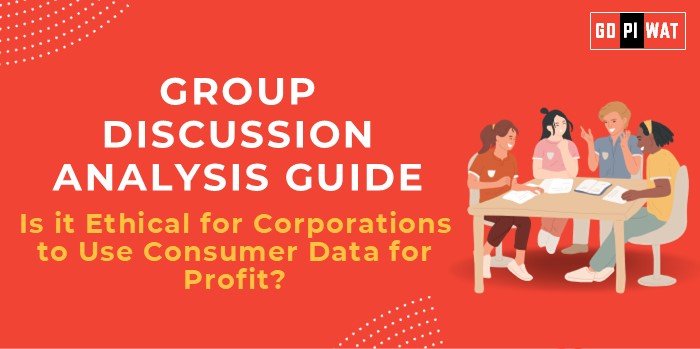📋 Group Discussion (GD) Analysis Guide: Is it Ethical for Corporations to Use Consumer Data for Profit?
🌐 Introduction to the Topic
Opening Context: In an era of rapid technological advancement, consumer data has emerged as a highly valued resource, often referred to as the “new oil.” Corporations leverage this data for personalized marketing, product innovation, and profit maximization. However, this practice raises significant ethical questions about privacy, consent, and fairness.
Topic Background: The ethical debate centers around the balance between corporate interests and consumer rights. Major incidents, like the Cambridge Analytica scandal, have spotlighted data misuse, while regulatory frameworks like GDPR aim to ensure ethical practices. This topic is vital for B-school students as it combines business strategy, ethical dilemmas, and regulatory considerations.
📊 Quick Facts and Key Statistics
- 📈 Global Data Economy Size: Projected to reach $273.4 billion by 2026, highlighting its profitability.
- 📉 Consumer Trust: 81% of consumers feel they have little control over their data usage (Pew Research, 2023).
- 🔓 Data Breaches: Over 1.8 billion records compromised globally in 2023 (Cybersecurity Ventures).
- ⚖️ GDPR Penalties: €1.5 billion in fines imposed in 2023 alone, underlining the regulatory focus.
👥 Stakeholders and Their Roles
- 🏢 Corporations: Collect, analyze, and monetize consumer data for business growth.
- 👥 Consumers: Provide data, often unwittingly, through online interactions.
- 🏛️ Governments and Regulators: Enforce laws like GDPR, CCPA, and India’s DPDP Act to protect privacy.
- 🌐 Technology Platforms: Act as intermediaries facilitating data collection and advertising.
🏆 Achievements and Challenges
✨ Achievements:
- 📊 Personalized Marketing: Companies like Netflix use consumer data to achieve 80% content engagement through recommendations.
- 🌍 Economic Value: Data-driven strategies contribute to a $15 trillion global digital economy.
- 🤖 Innovation: AI-powered services rely on vast data pools to enhance user experiences.
⚠️ Challenges:
- 🔒 Privacy Violations: Scandals like Facebook-Cambridge Analytica erode consumer trust.
- ⚖️ Inequality: Data monetization benefits corporations disproportionately over individuals.
- 🌎 Global Disparities: Developing nations lack robust regulatory frameworks compared to the EU or USA.
🌐 Global Comparisons:
- 🇪🇺 EU: Strict GDPR enforcement balances data usage and privacy.
- 🇺🇸 USA: Business-friendly laws often prioritize corporate growth over consumer rights.
📖 Case Study: Apple successfully markets privacy as a feature while monetizing anonymized data.
💬 Structured Arguments for Discussion
- ✔️ Supporting Stance: “Data monetization drives innovation, enabling corporations to provide free or affordable services like Google Search and Facebook.”
- ❌ Opposing Stance: “Unethical data practices violate consumer trust and privacy, as seen in high-profile data breaches.”
- ⚖️ Balanced Perspective: “While data monetization fuels growth, stringent regulations are essential to ensure ethical practices.”
🛠️ Effective Discussion Approaches
- 🎯 Opening Approaches:
- 📉 “Did you know that 81% of consumers feel powerless over their data usage? This reflects a critical ethical challenge for corporations.”
- 🔍 “The Cambridge Analytica scandal exemplifies the risks of unethical data usage, raising important questions about corporate responsibility.”
- 🔄 Counter-Argument Handling: Acknowledge corporate contributions to innovation and argue for balanced regulatory frameworks using GDPR as a benchmark.
🔍 Strategic Analysis of Strengths and Weaknesses
- 💪 Strengths: Drives innovation, enhances user experiences.
- ⚡ Weaknesses: Erodes trust, legal non-compliance risks.
- 🌟 Opportunities: Growth in data ethics consulting services.
- ⚔️ Threats: Consumer backlash, regulatory penalties.
📚 Connecting with B-School Applications
- 🌍 Real-World Applications: Ethical data use is a key theme in corporate governance and strategy courses.
- ❓ Sample Interview Questions:
- “How should corporations balance profitability with ethical considerations in data usage?”
- “What lessons can businesses learn from GDPR implementation?”
- 💡 Insights for Students: Explore roles in privacy consulting, digital strategy, or CSR programs.


